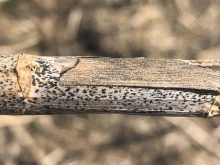A consortium of organizations led by the UN Food and Agriculture Organization is distributing two new wheat varieties resistant to the Ug99 fungus to Kenyan farmers.
The fungus — discovered in Uganda in 1999 — causes wheat stem rust, and cuts yield by 70 to 100 per cent. The regions directly affected by Ug99 account for over 37 per cent of the global wheat production.
“Wheat rusts, particularly the Ug99 strain, are a major threat to food security,” said Yukiya Amano, director general of the International Atomic Energy Agency, one of the groups which developed the new varieties.
“This international project involving affected countries, plant scientists and breeders, and international organizations is a major breakthrough,” added Jose Graziano da Silva, director general of the FAO.
The rust-resistant varieties were developed by exposing seeds, or plant tissue, to radiation. This caused mutations, which breeders used to develop new varieties.
About six tonnes of the new varieties will be made available this month for the next planting season in Kenya.














